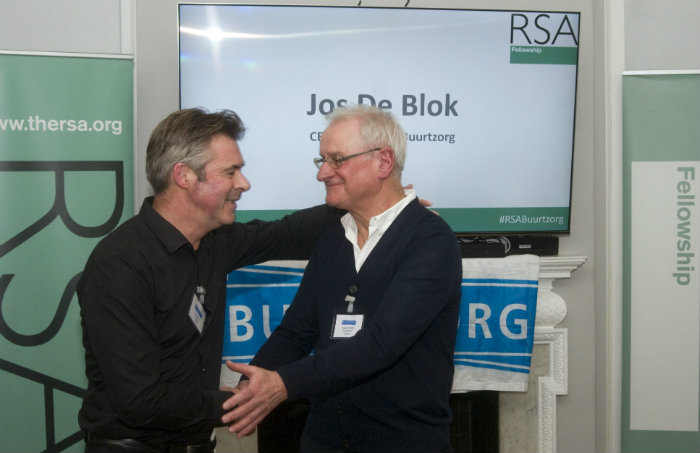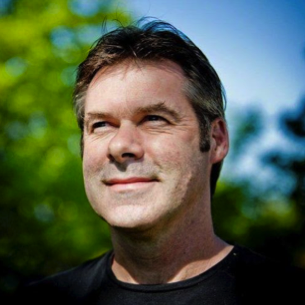Britain’s tradition of district nursing sets a great example to the world – in fact, it was one of the inspirations behind my own decision to become a nurse 30 years ago, having graduated as an economist. Yet every time I visit Britain I am told that neglect of community services is threatening the very survival of the country’s proudest creation, the National Health Service, because of the growing pressure on GPs and hospitals.
We had similar problems in the Netherlands a decade ago, and I’m glad to say that our success in tackling them has set an example that more and more nurses and caregivers in Britain and worldwide are now following. I’ve never regretted finding my true vocation, but by 2006 I had realised that the imposition of ‘new public management’ was strangling the profession and driving more and more nurses away. So, with three friends, I decided to do something about it. We formed a self-organised team to provide care to people in their own homes in the way our craft and values demanded.
We called it Buurtzorg – the English translation is Neighbourhood Care – and from that one team of four we have grown to more than 10,000 nurses in nearly 1,000 self-organised teams today. In addition, we are applying the same basic principles in mental health, youth and family support and other services, so that Buurtzorg social enterprises now have more than 14,000 employees supported by a back office of just 50.
People keep asking me for the secret of our success, and the truth is it’s simple. It’s all about starting from the perspective of the person needing care and support, and enabling and supporting caregivers to do their jobs with professionalism, vocational commitment and common sense.
I am delighted that more and more nurses and other caregivers in Britain are following our example – so much so that in December, at RSA House in London, I helped launch Buurtzorg Britain & Ireland. For the last couple of years, working in partnership with the social enterprise Public World, we have been supporting nurses and support workers, and their employers, to apply the lessons of our experience in the NHS and social care all over England and Scotland. It is still early days, but the signs are promising, as shown by an independent evaluation of the neighbourhood nursing teams in the London boroughs of Lambeth and Southwark published last month.

Jos de Blok with Brendan Martin FRSA, Founder and Managing Director of Public World (photo credit: Stefano Cagnoni)
Different countries have somewhat different systems, but the basic problems in Britain are the same as those we set out to tackle a decade ago: top-down command and control instead of professional freedom and responsibility; systems that are far more complex than they need to be; fragmented services instead of holistic care.
Our neighbourhood teams arrange all the care themselves, working with their clients, their social networks and when necessary other parts of the health and care system, to support independent wellbeing at home. We support them with regional coaches, an effective IT system they helped to design, and the small back office that takes care of administrative burdens, freeing nurses to nurse rather than telling them how to! The result is not only improved wellbeing for our clients and staff. The insurers through which Dutch health and social care is funded are happier too, because better care and lower overheads means less time and money wasted.
Buurtzorg is now supporting change in more than 25 countries worldwide – I am just back from working with our new partners in India. The environments vary and of course that means we need to be pragmatic about how our principles are applied. But the fundamentals are the same everywhere, expressed in the title of my lecture when I was honoured to receive the RSA Albert Medal in 2014: humanity above bureaucracy. We are very grateful for the RSA’s continuing support, and always glad to hear from Fellows who would like to lend their knowledge, skills and commitment to our efforts.
When my friends and I sat around my kitchen table and decided to take the plunge little over a decade ago we never imagined how fast we would grow in the Netherlands.
So who knows what could we all achieve together worldwide in the next ten years?
Jos de Blok is the founder and CEO of Buurtzorg Nederland. You can find him on Twitter on @josdeblok.
Related articles
-
A social justice cause for the 2020s – reining in health spending
Anthony Painter
Anthony Painter argues that the state expansionists will win over small statists as healthcare expenditure is destined to increase. But their victory may be a Pyrrhic one unless the growth can be limited so better support can also be given to housing, economic security, education and lifelong learning.
-
Did Bevan's bedpan test set the NHS on the wrong track?
Ed Cox
Ed Cox, Director of Public Services and Communities, argues that the NHS needs a more devolved approach in the decade ahead.
-
8 principles for future health and care systems
Tom Harrison
The RSA and NEF in partnership with NHS England publish eight principles to develop a community-led health system.




Join the discussion
Comments
Please login to post a comment or reply
Don't have an account? Click here to register.
We are working with the principles of 'next stage' organisations (of which Buurtzorg is one) in the South West of England. Various parts of the health sector have engaged with us but none have, yet, felt they have the autonomy to evolve to the Buurtzorg way of being. Hopefully the narrative in this article will reach ministers and induce 'permission' for wider take up.
A typical NHS system, driven by centralized decision-making and dominated by the views of the few, can never be satisfactory. Reorganizations might offer hope of improvement but never the certainty of outcome. Democratising the system by harnessing the wisdom of the crowd (here the patients) and empowering the professionals will ensure the system becomes truly responsive, flexible and resilient. The Transform programme is a bold initiative and a welcome one.
I'm fascinated by this model and think it is absolutely the way forward for this type of care in the NHS. How then do we keep this model alive and allow it to flourish when community services in the NHS continue to be pushed towards a centralisation model ?
This sound like a brilliant initiative and I hope it succeeds in the UK. I assume it would encompass NHS/local authority/non-profit services and not include private/for profit services?
Hi Ros. Yes, we can reassure you on that score. We are currently working with NHS commissioners and providers, local authorities and social enterprises. Our values are completely aligned with the basic premise of the NHS -- equality of access to services free at the point of use -- and we are determined to show person-centred care can be created even within hierarchical bureaucratic organisations. But we mustn't kid ourselves: to grow to scale and sustain freedom and responsibility at the frontline even those organisations that are 'testing and learning' with us now will need radical change in leadership mindsets, culture and structure.
Interesting article. How is Buurtzorg funded in the Netherlands?